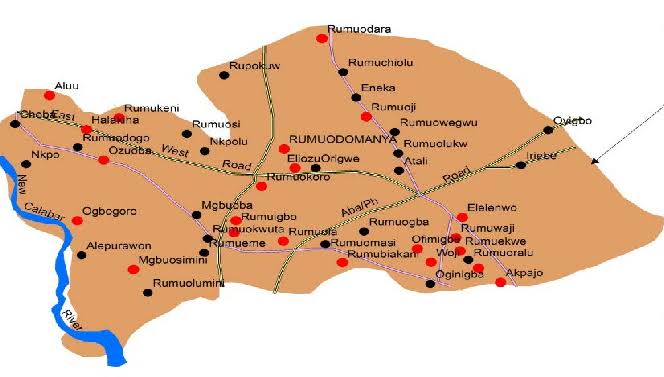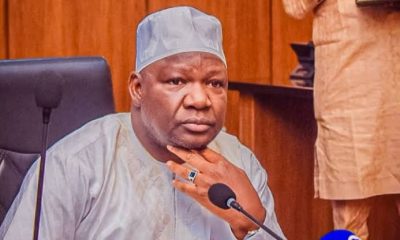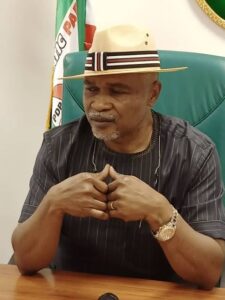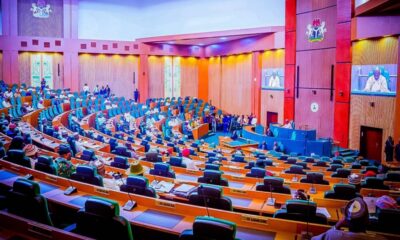Opinion
OF YULETIDE SEASON, PEOPLES EMPOWERMENT, AND OBIO-AKPOR COMMUNITIES

In various countries across the world, the month of December is usually special and unique. From the weather to people’s mood and activities, it evokes some peculiar frenzy that are easily contagious. In diverse ways and practices, people look forward to the season as the perfect time to “wind down” and “close shop” having survived the vicissitudes of the out-going year. For some, it is the period for holidays and vacation. For others, weddings, and numerous social engagements are scheduled during this season. All around the globe, airports are very busy. Same with parks, and sea ports. Generally, people look forward; with excitement to hearty re-connection, communication, and celebrations with families, friends, and loved ones.
Given the global economic meltdown and it’s negative effects on the country, peoples expectations were measured and reasonable. Conscious of the debilitating economic situation that has thrown many people into accentuating poverty and corrosive hunger, many were not confident of enjoying blissful yuletide season. Due to their scant and scarce finances, many people after calculations and conjectures, eschewed from elaborate and grandiose preparations for the season.
For the political class, and those in various leadership positions at federal, state, and local government levels, the last yuletide season was slightly different. In times past, people looked forward to “hand of fellowship” from leaders. Politicians and public officials happily “give back” to their constituents. However, for December 2024, sighting “national economic situation” as comfortable alibi, the expectations of constituents were not fully met. Indeed, there were unconfirmed stories about politicians who devised “ingenious measures” to avoid possible umbrage of their constituents. To extricate themselves from the harassment of hangers-on, and public ridicule by fearless constituents, some politicians allegedly think outside the box. This included, holidays outside the country; remained incommunicado; stayed back in Abuja; hibernated in state capitals as mark of “loyalty” to their principals.
For the people of Obio-Akpor federal constituency in Rivers state, the story was entirely different. Variously described as the melting pot of the Treasure Base; moniker for Rivers, residents and indigenes of the 17 Wards and over 70 communities that make up the constituency experienced flurry of empowerment programmes, give-aways, and convivial celebrations during the yuletide season. According to reports, from the first week of December to the last few days of 2024, the buzz in and around the constituency was spectacular, and electrifying.
In continuation of the empowerment and skills development initiatives; which has been running from mid-2023, emplaced by Rep. Chinda Kingsley, member representing Obio-Akpor Federal Constituency in the House of Representatives, many people from across the communities benefitted. Youths, women, and men who participated in the three-month training programmes which included tailoring, interior decoration, hair dressing, barbing and other relevant skills geared towards self-reliance, and entrepreneurial development were given start-up packs, materials, equipment, and cash. The non-partisan, all-encompassing, and fair-to-all intervention initiative had beneficiaries from various communities across the 17 Wards. From records, the long-list of beneficiaries covers constituents from Rumuewhara, Rumuolumeni, Rumuokoro, Elelenwo, Rumuodara, Rumuola, Rumueme, Rumuepirikom, Rumuodomaya, Choba and other communities within the federal constituency.
Guests, leaders, stakeholders, constituents, and numerous others that attended the closing ceremony and empowerment presentation that held late December in Port Harcourt were visibly elated about the empowerment programmes. As expected, the beneficiaries could not hide their excitement and enthusiasm for the life-changing gesture. Ms. Ruth Ogbona who got a sewing machine confirmed that, “I am very happy for participating in the three-month training. With all what I have learned, and presentation of this brand new, and latest sewing machine, my dream of being a fashion designer is now reality.” Another beneficiary, Ms. Peace declared that, “it is a dream come true. I thank God for this opportunity which will make me and others grow up, and be better people in our communities.”
Some other beneficiaries while expressing their gratitude to Rep. Chinda alluded to the transparency of the various training programmes, noted that the initiative; which is still continuing is arguably the first by any legislator in the state. Mr. David King said that, “I and virtually all other participants were selected fairly and freely by the coordinators. I did not lobby or spoke to anyone. I thank Chinda for this rare privildge. He is a blessing to the people of Obio-Akpor.” In the words of Ms. Suzie, “Hon. Chinda is truly a man of his words because while campaigning he said, ‘I Win You Win’ and made promises not to abandon the people. I am very happy that since August 2023, he has embarked on different empowerment programmes that have positive impact on all of us.” An elated Ms. Amadi declared that, “I am excited about this empowerment material which I have desired for many years. That I am a beneficiary without knowing anybody makes it more fulfilling and heart warming. My prayer is that God will continue to bless Hon. Chinda in all he is doing.”
Cognisant of the premium placed on Christmas and New Year celebrations by people, Rep. Chinda distributed different food items, and condiments around Obio-Akpor. These included rice, beans, garri, groundnut oil, tomatoes, maggi, and other items. Chiefs, community leaders, elders, and religious leaders benefitted from the end of year give-aways. Others included political stakeholders, political associates, informal groups, trade associations, ethnic unions, women, men, and youths. Indeed, the give-aways covered the entire 17 Wards in Obio-Akpor federal constituency. The impact of the gesture was extensive that it generated widespread commendation and gratitude among various strata of the constituency. A youth leader, Mr. Bright John affirmed that, “we are very fortunate to have a Leader and Representative who is caring, altruistic, and passionate about the well-being of his constituents. Unlike what normally happens, Chinda ensured that the items percolate to everyone.” For Mrs. Priscilla Ogechi Kanu, “this has never happened. Hon. Chinda has contributed positively to the growth of many people. My prayer is that God will perfect everything that concerns him.” Chief Alphonsus Obiereka, a community leader and politicians declared that, “apart from the distribution of food items and assorted condiments to people, as well as empowerment programmes, there are other initiatives by Chinda that are positively touching lives of people, and improving development in and around our various communities.”
Indeed, the people of Obio-Akpor have witnessed numerous projects, programmes, and initiatives that are making broad-based, and cross-disciplinary impacts on residents and citizens. Since 2023, there are visible interventions across the 17 Wards with special focus on skills development, education, health, and agriculture. Some of these includes medical outreach; digital and artificial intelligence trainings; entrepreneurial development on ICT, welding, and chalk production. Others include agricultural training through the OK Chinda Youth AgriBusiness & Food Security Initiative (OYAFSI); provision of educational soft-structures; payment of school fees for some categories of students; yearly distribution of JAMB forms, and many others. Participants and beneficiaries of these programmes, regularly gives testimonies about the timeliness and importance to Obio-Akpor, and Rivers state. According to Nene Bright, one of the graduates of the mid-2024 Artificial intelligence training programme, “it was an eye-opening and career-finding exercise. It has boosted my horizon to unleash my potentials, and exploit the numerous opportunities in information technology.” For Boniface Godswill, “passing through the OYAFSI, is the most reasonable decision I have taken in life. I now know the vast opportunities imbedded in agriculture, few of which I have started to exploit.”
For many people in Obio-Akpor federal constituency, the last yuletide season is one they will not forget in hurry. Days, weeks, and months to come, the sweet feelings, and pleasurable memories will keep resonating in their minds. Collectively, these gestures, initiatives, and programmes are still attracting positive endorsements, and public thumbs up. Many people are confident that Chinda will sustain, deepen, and possibly expand the scope of the numerous interventions. Many are already doing the countdown to 2025 yuletide season.
BOLAJI AFOLABI, a development communications specialist, was with the Office of Public Affairs in The Presidency.
Opinion
CBN under Cardoso and $6.83 Billion balance of payments surplus in 2024 that signals economic resurgence

By Ibrahim Modibbo
Since his appointment as the Governor of the Central Bank of Nigeria, in October 5, 2023, Olayemi Cardoso has continue to bring on board wide-range of macroeconomic reforms, stronger trade performance, and renewed investor confidence in Nigeria’s economy, that were aimed at putting the country back to its economic footing, as a strong economy that is second to none in Africa.
As part of the ongoing reforms, the Central Bank of Nigeria recently announced a Balance of Payments (BOP) surplus of $6.83 billion for the 2024 financial year, marking a decisive turnaround from deficits of $3.34 billion in 2023 and $3.32 billion in 2022, according to a press statement from Mrs Sidi-Ali, Hakama, the Ag. Director, Corporate Communications of the apex bank.
CBN says “the current and capital account recorded a surplus of $17.22 billion in 2024, underpinned by a goods trade surplus of $13.17 billion. Petroleum imports declined by 23.2% to $14.06 billion, while non-oil imports fell by 12.6% to $25.74 billion. On the export side, gas exports rose by 48.3% to $8.66 billion, and non-oil exports increased by 24.6% to $7.46 billion.”
While “remittance inflows remained resilient, with personal remittances rising by 8.9% to $20.93 billion. International Money Transfer Operator (IMTO) inflows surged by 43.5% to $4.73 billion, up from $3.30 billion in 2023, reflecting stronger engagement from the Nigerian diaspora. Official development assistance also rose by 6.2% to $3.37 billion,” the statement added.
Nigeria recorded a net acquisition of financial assets totalling $12.12 billion. Portfolio Investment inflows more than doubled, increasing by 106.5% to $13.35 billion, while resident foreign currency holdings grew by $5.41 billion, indicating stronger confidence in domestic economic stability. Although foreign direct investment fell by 42.3% to $1.08 billion, the overall financial account posted notable gains.
The country’s external reserves increased by $6.0 billion to $40.19 billion by year-end 2024, bolstering its external buffer.
Notably, net errors and omissions narrowed significantly by 79.5% to negative $5.10 billion in 2024, down from $24.90 billion in 2023, reflecting substantial improvements in data availability and capture. This represents a major advance in data accuracy, transparency, and overall reporting integrity.
The 2024 BOP surplus highlights the effectiveness of Nigeria’s ongoing reform agenda. The liberalisation and unification of the foreign exchange market, a disciplined monetary policy approach to managing inflation and stabilising the naira, and coordinated fiscal and monetary measures have all contributed to enhanced competitiveness and investor sentiment.
“The positive turnaround in our external finances is evidence of effective policy implementation and our unwavering commitment to macroeconomic stability,” said the Governor of the Central Bank of Nigeria. “This surplus marks an important step forward for Nigeria’s economy, benefiting investors, businesses, and everyday Nigerians alike,” the statement further noted.
Other notable indicators to building strong economy by this policy include but not limited to a stronger trade performance, particularly in the current and capital accounts, with a surplus of $17.22 billion in 2024, has contributed to the balance of payments surplus. A goods trade surplus of $13.17 billion that will further strengthens the positive trend. The decline in petroleum and non-oil imports also contributes to a more favorable trade balance.
It will noteworthy to note that the CBN’s reforms have increased investor confidence, leading to higher foreign portfolio investment inflows. Portfolio investment inflows more than doubled in 2024, reaching $13.35 billion. This influx of capital indicates a stronger belief in the stability and growth prospects of the Nigerian economy.
The apex bank’s disciplined monetary policy and FX market reforms on the other hand are aimed at managing inflation and stabilizing the Naira, has contributed to a more stable financial system.
The liberalization and unification of the foreign exchange market have led to greater transparency and reduced distortions in the market.
The implementation of an Electronic Foreign Exchange Matching System (EFEMS) further enhances transparency and efficiency in the FX market.
The reforms, including the unification of the exchange rate, have improved Nigeria’s competitiveness and attracted more foreign investment. Testament to this is the clearing of a $7 billion forex backlog which has also boosted the country’s image with foreign investors.
Also, the significant improvements in data availability and capture have led to a marked reduction in net errors and omissions in the balance of payments data. This enhanced data integrity provides a more accurate picture of the country’s economic performance and builds trust with stakeholders.
In conclusion, the combination of strong trade performance, renewed investor confidence, disciplined monetary policy, and improved data integrity, all facilitated by the CBN’s wide-ranging reforms, are key indicators of Nigeria’s economic resurgence. These developments demonstrate the positive impact of the reforms on the nation’s external finances and overall economic stability.
Dr Moddibo, a public analyst, wrote in from Abuja
Opinion
CBN leads financial dialogue with JP Morgan, NGX, others, in pre-spring meetings Forum

By Dr. Ibrahim Modibbo
In anticipation of the International Monetary Fund (IMF) and World Bank Group (WBG) Spring meetings which commenced on Monday, April 21, 2025, the Central Bank of Nigeria (CBN) partnered with J.P. Morgan, the Nigerian Exchange Group (NGX) and Africa Private Capital Association (AVCA) to host a high-profile global forum at Nasdaq MarketSite in New York on Thursday, April 17, 2025, according to press statement by Dr Ibrahim Moddibo.
The forum, titled “The Nigeria Investment Agenda: Pathways for Growth & Global Partnerships,” convened global investors, diaspora leaders, and senior financial stakeholders to examine Nigeria’s macroeconomic prospects and ongoing reform progress.During his commanding address, Governor Olayemi Cardoso outlined his comprehensive reform strategy encompassing monetary tightening, foreign exchange market transparency, and enhanced financial governance.
He emphasized that these initiatives are establishing the foundation for sustainable macroeconomic stability and heralding a new era of transparency and confidence.Governor Cardoso reaffirmed the CBN’s unwavering commitment to rebuilding credibility through orthodox monetary policy, transparency, and consistency.
“We inherited a crisis of confidence but chose a different path. We’re not turning back,” he stated decisively.In a powerful fireside chat between the Governor and Nobel Prize-winning economist Dr. James Robinson, Reverend Richard L. Pearson Professor at the University of Chicago, Governor Cardoso elaborated on his vision to reestablish the CBN as a credible, trusted institution – rooted in domestic excellence and respected internationally.Mr. Muhammad Sani Abdullahi, Deputy Governor for Economic Policy at the CBN, delivered a macroeconomic update highlighting sharp increases in foreign exchange turnover, emerging signs of disinflation, and strengthening external reserves. “With a market-determined exchange rate and a transparent, rules-based policy framework, confidence is gradually being restored in Nigeria’s economy,” he noted.
Welcoming participants to the forum, Dr. Nkiru Balonwu, Adviser to the CBN Governor on Stakeholder Engagement and Strategic Communication, framed the forum as a key moment in the Bank’s broader engagement strategy. “Today is more than a conversation,” she noted.
It’s about opening the books on the CBN’s transformation story under Governor Cardoso – sharing the facts, interrogating the progress, and looking ahead together at what more can be done to build sustainable partnerships and unlock long-term capital,” she explained.
Another key highlight of the event was the panel discussion entitled “Repricing Nigeria: Assessing the Scope for Sustained Change.” Moderated by Gavin Serkin, Founder of New Markets Media & Intelligence, the panel featured global financial luminaries: Joyce Chang, Chair of Global Research at JPMorgan Chase; Jason Rekate, Global Co-Head of Corporate Banking at Citi; Razia Khan, Chief Economist for Africa & Middle East at Standard Chartered; and Ahmad Zuaiter, Co-Founder & CIO of Jadara Capital Partners. Each panelist provided expert perspectives on Nigeria’s investment landscape, noting renewed international interest driven by improved fundamentals, strengthened governance, and clearer policy direction.
The CBN Board and Monetary Policy Committee were represented by US-based diaspora members Mr. Robert Agbede, Prof. Melvin Ayogu, and Dr. Aloysius Ordu, underscoring the Bank’s global engagement and commitment to leveraging Nigerian talent worldwide. Temi Popoola, Group CEO of NGX, moderated the Q&A session, while Dr. Olubukola Akinniyi Akinwunmi, Director of Banking Supervision at CBN, delivered the closing remarks.The forum focused on substantive discussions and future prospects: engaging critical voices, evaluating progress, and identifying requirements for building lasting partnerships and attracting long-term capital. Central to this endeavor is a clear objective: reestablishing the CBN as a credible, trusted institution respected globally and dedicated to excellence at home.
Dr. Ibrahim Modibbo, a public affairs analyst writes from Abuja.
Opinion
Instagram , WhatsApp troubled by antitrust laws

By Sonny Aragba-Akpore
While we are yet to grapple with the fate of Tik Tok which President Donald Trump had asked its parent company Byte Dance of China to divest from it’s American operations or be banned, Meta Group, owners of Instagram and WhatsApp, is troubled over antitrust concerns.
The U.S. Federal Trade Commission (FTC) has taken the group to court over anti competition issues.
Specifically, the FTC wants Meta to divest from its two biggest companies in an antitrust trial that could redefine the future of social media.
And so Meta’s world is troubled as Mark Zuckerberg’s company could be forced to sell Instagram and WhatsApp if it loses the lawsuit that has just begun in the U.S.
The FTC has accused Zuckerberg’s company of having bought both platforms to eliminate competition and maintain a monopoly on social media.
If the court rules against them, it would be a historic blow to the tech giant.
Zuckerberg acquired Instagram in 2012, and then, two years later,(2014) completed his trio by buying WhatsApp.
Facebook is the third leg of the trio and this easily makes the group the largest tech owner in the world.
Although these acquisitions were approved by the FTC itself at that time ,but now this lawsuit seeks to reverse that approval, arguing that the purchase was not for innovation but to “neutralize” emerging rivals like Instagram which was acquired in 2012 and thus take control of the entire market.
The FTC claims that Meta has used its financial muscle to block competition, buying up emerging apps instead of competing with them, and it has been doing this since 2008! Everything is based on 2012 emails where Zuckerberg had expressed concern about Instagram’s rapid growth compared to Facebook’s performance (which was his only app at the time). In those emails, Zuckerberg admitted it was better to buy than to compete. And so he did, acquiring the app years later.
“On the other hand, he also bought WhatsApp, and of course that reinforces the FTC’s accusation. Meta strengthened its control over the digital system, keeping these apps as separate platforms but under the same power structure” analysts reason.
Meta has not denied the purchases, even though it rejects having acted in an anti-competitive way, calling the case a “weak lawsuit that ignores reality,” since they believe they face strong competition from platforms like TikTok, YouTube or X among many other apps.
During the trial, Zuckerberg claimed he bought Instagram for its camera technology, not because the social network was on the rise, but the 2012 messages don’t seem to support that statement very well.
In the likelihood that FTC wins this case, Meta could be forced to sell Instagram, WhatsApp, or both. This wouldn’t necessarily mean an immediate change for users, but it would shift the balance in the digital market, according to experts.
Digital sociologists think that Meta would make it easier to regulate social networks individually by the FTC.
One of the major implications will be on things like content moderation, privacy, or the use of personal data.
“If it gets split, it would be easier for lawmakers, ensuring proper service to users” digital sociologists admit.
There are however fears of who buys if it gets to that .
For instance If a controversial figure like Elon Musk or an investment fund takes control of Instagram, like what happened with Twitter (now X), it’s possible that many users would leave in large numbers for new alternatives that may emerge, like BlueSky.
“But if it falls into the hands of a discreet company, without major visible changes, it’s likely that most people will keep using it as they always have.”
Although Meta does not reveal exactly how much it earns from each app, it is estimated that Instagram generates around $37 million a year, surpassing Facebook’s revenue according to analysts.
“So of course, Zuckerberg’s eagerness to get out of this case is clear: they can’t afford to lose that income because it would be a catastrophe for Meta” another analyst submits.
The expectations are dicey because the court’s decision will not only affect Meta, but could also open the door to more lawsuits against other big platforms for similar monopoly practices. And at a time when the control of social networks is more questioned than ever, this case could define the future of the digital system in terms of free choice and regulations.
Instagram and WhatsApp which were acquired over a decade ago have become social powerhouses and easily the biggest platforms in that genre.
This looming antitrust trial will be the first big test of President Trump’s Federal Trade Commission’s ability to challenge Big Tech.
The lawsuit was first filed against Meta — then called Facebook — in 2020, during Trump’s first term. It claims the company bought Instagram and WhatsApp to squash competition and establish an illegal monopoly in the social media market.
FTC contends that Meta has maintained a monopoly by pursuing CEO Zuckerberg’s strategy, “expressed in 2008: ‘It is better to buy than compete.’ True to that maxim, Facebook has systematically tracked potential rivals and acquired companies that it viewed as serious competitive threats.”
U.S. antitrust laws are enforced by both the FTC’s Bureau of Competition and the Antitrust Division of the Department of Justice. The agencies consult before opening any investigation. The Antitrust Division handles all criminal antitrust enforcement.
The FTC,s Bureau of Competition enforces the nation’s antitrust laws, which form the foundation of a free market economy.
The antitrust laws promote the interests of consumers; they support unfettered markets and result in lower prices and more choices.
The Federal Trade Commission Act and the Clayton Act, both passed by Congress in 1914, give the Commission authority to enforce the antitrust laws.
These laws prohibit anticompetitive mergers and business practices that seek to prevent hard-driving competition, such as monopolistic conduct, attempts to monopolize, and conspiracies in restraint of trade.
The Bureau of Competition investigates potential law violations and seeks legal remedies in federal court or before the FTC’s administrative law judges. The Bureau also serves as a resource for policy makers on competition issues, and works closely with foreign competition agencies to promote sound and consistent outcomes in the international arena.
WhatsApp (officially WhatsApp Messenger) is an American social media, instant messaging (IM), and voice-over-IP (VoIP) service owned by technology conglomerate Meta. It allows users to send text, voice messages and video messages, make voice and video calls, and share images, documents, user locations, and other content.
WhatsApp’s client application runs on mobile devices, and can be accessed from computers.
The service requires a cellular mobile telephone number to sign up.
In January 2018, WhatsApp released a standalone business app called WhatsApp Business which can communicate with the standard WhatsApp client.
The service was created by WhatsApp Inc. of Mountain View, California, which was acquired by Facebook in February 2014 for approximately US$19.3 billion.
It became the world’s most popular messaging application by 2015,and had more than two billion users worldwide by February 2020,confirmed four years later by 200 million new registrations per month.
By 2016, it had become the primary means of Internet communication in regions including the Americas, the Indian subcontinent, and large parts of Europe and Africa.
Instagram is an American photo and short-form video sharing social networking service owned by Meta Platforms. It allows users to upload media that can be edited with filters, be organized by hashtags, and be associated with a location via geographical tagging.
Posts can be shared publicly or with preapproved followers. Users can browse other users’ content by tags and locations, view trending content, like photos, and follow other users to add their content to a personal feed.
A Meta-operated image-centric social media platform, it is available on iOS, Android, Windows 10, and the web. Users can take photos and edit them using built-in filters and other tools, then share them on other social media platforms like Facebook.
It supports 32 languages including English, Hindi, Spanish, French, Korean, and Japanese.
Instagram was originally distinguished by allowing content to be framed only in a square aspect ratio of 640 pixels to match the display width of the iPhone at the time.
In 2015, this restriction was eased with an increase to 1080 pixels. It also added messaging features, the ability to include multiple images or videos in a single post, and a Stories feature—similar to its main competitor, Snapchat, which allowed users to post their content to a sequential feed, with each post accessible to others for 24 hours.
As of January 2019, Stories were used by 500 million people daily.
Instagram was launched for iOS in October 2010 by Kevin Systrom and Mike Krieger. It rapidly gained popularity, reaching one million registered users in two months, 10 million in a year, and one billion in June 2018.
In April 2012, Facebook acquired the service for approximately US$1 billion in cash and stock. The Android version of Instagram was released in April 2012, followed by a feature-limited desktop interface in November 2012, a Fire OS app in June 2014, and an app for Windows 10 in October 2016.
Although often admired for its success and influence, Instagram has also been criticized for negatively affecting teens’ mental health, its policy and interface changes, its alleged censorship, and illegal and inappropriate content uploaded by users.
-

 News12 hours ago
News12 hours agoJust in: Senator Natasha tenders satirical ‘apology’ to Akpabio
-

 News6 hours ago
News6 hours agoInsecurity: BUDA urges govt to quickly rescue Baruten from terrorists
-

 News8 hours ago
News8 hours agoUNUSUAL! Without invitation, Police declared me wanted — Daughter of ABC Transport owner
-

 News3 hours ago
News3 hours agoBreaking: Late gospel singer Osinachi’s husband sentenced to death by hanging
-

 News5 hours ago
News5 hours agoWeeks to 2nd anniversary, Niger deputy gov, plans to resign, move out personal effects
-

 News21 hours ago
News21 hours agoBenue LG chairman gives Fulanis 48hrs to leave all farmlands
-

 News21 hours ago
News21 hours agoFive suspected kidnappers eliminated by police in Delta
-

 Metro14 hours ago
Metro14 hours ago‘My husband always makes love throughout the night until morning’ – Woman Wants Divorce

















